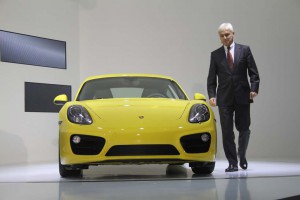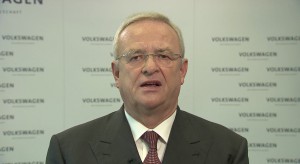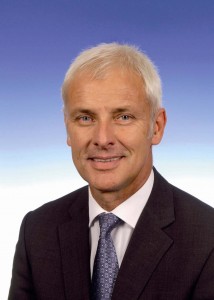As the new head of Volkswagen AG, Matthias Mueller will be overseeing the largest automaker in the world, a sprawling empire of brands and manufacturing facilities stretching from Beijing to Berlin. But that empire is also facing the biggest crisis in its 78-year history, one that some observers believe could destroy it.
The veteran Volkswagen executive, who until this morning was in charge of the Porsche brand, will now run the entire company, replacing Martin Winterkorn as CEO, Winterkorn forced out in the wake of the disclosure VW had been cheating on diesel emissions tests. Even as the VWAG board met to approve the 62-year-old Mueller’s promotion, authorities said the maker had rigged tests on 2.8 million diesel vehicles sold there, more than six times as many as have been impacted in the U.S.
“He’s walking into a firestorm,” said analyst Joe Phillippi, of AutoTrends Consulting. But Phillippi stressed that even if Mueller can come up with a “fix-it plan,” VW’s troubles are far from over, “and are going to take years to resolve.”
There’s no question that the German automaker – which operates a dozen brands, ranging from entry-level Seat and Skoda to high-line marques Audi, Bentley and Bugatti – has some desperate and immediate challenges.
VW officials this week acknowledged the company used special software code, dubbed a “defeat device” to get its diesel models to recognize when they were undergoing emissions tests. Otherwise, the engine control system would be relaxed, allowing the vehicles to produce up to 40 times the legal limit in the U.S. of noxious emissions.
(Is your diesel dirty? Click Here to that and other questions about the VW scandal.)
The carmaker has ordered a stop-sale for those vehicles in the U.S. while it works up a solution. It’s unclear if software updates alone can fix things. If not, VW might have to compensate owners for reduced performance and mileage, perhaps even buy back some vehicles. Meanwhile, it is facing a potential $18 billion fine for violating the U.S. Clean Air Act, a criminal investigation by the Justice Department, and numerous class action suits. Similar challenges could follow around the world.
The new CEO “has to put the emphasis on VW customers, whatever the cost,” said Mike Jackson, CEO of the largest U.S. auto retail chain, Florida-based AutoNation. That would be just the first step in rebuilding trust in the brand, something shattered by the diesel test scandal.
(For more on how the VW scandal will affect diesel sales, Click Here.)
The test rigging only worsens one of Volkswagen’s longer-term challenges, said analyst Phillipim noting that the maker has been struggling for decades to catch up to the Asian marques that long ago pushed past VW as the dominant imports in the U.S. Even as the overall market was recovering from the Great Recession, Volkswagen brand sales have steadily fallen over the last four years.
The situation is compounded by the fact that the overall automotive market in China – where VW is the dominant manufacturer – has been slowing rapidly in recent months.
As a result, VW could very well could lost the king-of-the-hill status it obtained during the first half of this year when it pushed past Toyota to become the world’s best-selling automaker.
Even as its status in the automotive hierarchy has grown, however, VW has struggled to turn record sales into record profits. While most of the world’s major makers reported gains during a generally strong second quarter, VWAG saw a 15.9% drop, to 2.73 billion euros.
That led former CEO Winterkorn to enact a number of cost-cutting steps over the past year. But one key measure meant to put the maker on track hasn’t paid off as anticipated.
Like key competitors such as Toyota and General Motors, VW has developed a handful of so-called vehicle “architectures,” platforms likes its MQB, that can be shared by a wide range of different models and brands. But instead of yielding major savings from improved economies of scale, “they are far more expensive to produce,” noted Phillippi, and that must be fixed.
Another long-term challenge for Mueller will be to decide whether to continue VW’s strong dependence on diesels – which, of late had accounted for a quarter of its sales in the U.S. and nearly half in Europe. But the maker was already putting more and more emphasis on battery technology to meet emissions and mileage targets. At the Frankfurt Motor Show last week, several executives said hybrids, plug-ins and pure electric models would likely begin to replace some high-mileage diesel options.
For the moment, Matthias Mueller will have to pick up where CEO predecessor Winterkorn left off, by sounding a strong note of contrition. He will have to accept that, if anything, VW’s earnings will fall even more sharply in the months, perhaps even years, to follow. The more immediate challenge will be regaining the trust of both the public and regulators around the world.
(VW cheated on emissions as far back as 1973. Click Here for the story.)




I doubt VW diesel customers are going to lose sleep over the emissions control issue as long as the engines are properly fixed. The rest of the world (ROW) customers are not going to give up diesels for EVs or any other silly fad. If push came to shove VW/Audi customers would switch brands if VW discontinued diesel sales as BMW and M-B both sell a version of the “blue tech” clean diesels. VW’s image certainly will take a hit unless it is proved that the cheating was limited to a specific group of people and not known or endorsed by management.
VW’s U.S. issues have never been addressed with the poor dealership experience, production quality issues and replacement parts costs just to name a few issues. I don’t see VW fixing these issues in the U.S. any time soon.